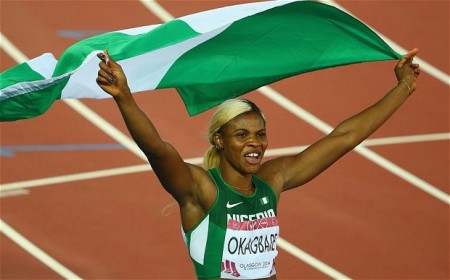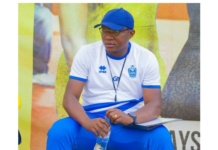
Blessing Okagbare completed the Commonwealth Games sprint double in Scotland on Thursday, winning the 200m final ahead of surprise English duo Jodie Williams and Bianca Williams with a time of 22.25 seconds. Though the three British sprinters who took second, third, and fourth place achieved personal best times, managing to keep three fancied Jamaican finalists behind them, they could not best Okagbare, 25, who also won the 100m final on Monday.
“I am happy I won,” said Okagbare. “It wasn’t favourable weather and running two rounds in one day is new for me.
“I wanted something faster. I didn’t get the time but I got the win and two golds. It’s amazing.”
Okagbare’s wins, albeit achieved in the absence of Jamaica’s world and Olympic champion Shelly Ann Fraser-Pryce, who elected to run only the sprint relay, and Australia’s Sally Pearson, who is off-form following injury, has banished the unfortunate news that Nigeria’s 16-year-old weightlifting sensation, Chika Amalaha, has been provisionally suspended from the Commonwealth Games after testing positive in a doping test taken after she won gold in the women’s 53kg category.
Amalaha provided an ‘A’ sample on July 25 which revealed traces of diuretics and masking agents. Even though it is widely believed that she would have taken any banned substance unwittingly at the behest of her coach, she will almost certainly lose her gold medal should her ‘B’ sample also test positive.
Should the ban stand, it would be the second consecutive Commonwealth Games to embroil Nigerian athletes in doping scandals. In Delhi in 2010, following the post-race disqualification of Australian sprinter/ high hurdler Sally Pearson in the Women’s 100 metres final, Nigeria’s Oludamola Osayomi was promoted from the silver medal position to gold only to subsequently test positive for the banned stimulant Methylhexaneamine. She in turn was disqualified from the gold medal position on 12 October 2010 and as a result Natasha Mayers and Katherine Endacott were promoted to the gold and silver positions respectively while Bertille Delphine Atangana of Cameroon was promoted to the bronze position.
Also in the Delhi edition of the ‘friendly games’, 400 metre silver medallist Folashade Abugan was disqualified after testing positive for testosterone prohormone, promoting Aliann Pompey of Guyana to the silver medal position, with the bronze medal going to Christine Amertil of the Bahamas. Abugan’s disqualification also meant team Nigeria lost the silver medal they earned for the 4 x 400m relay in which she ran.
Nigeria also has a history of doping offences in weightlifting. Back in 2001, the Nigerian Weightlifting Federation was suspended for repeated doping violations by the International Weightlifting Federation and banned from competing in the following year’s Manchester Games.








